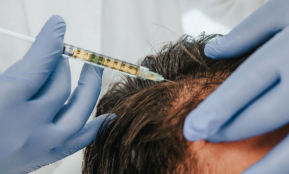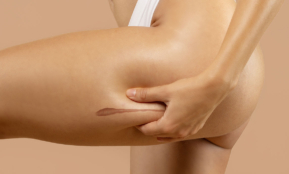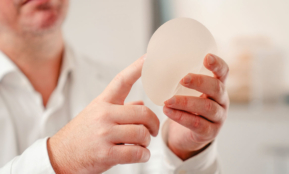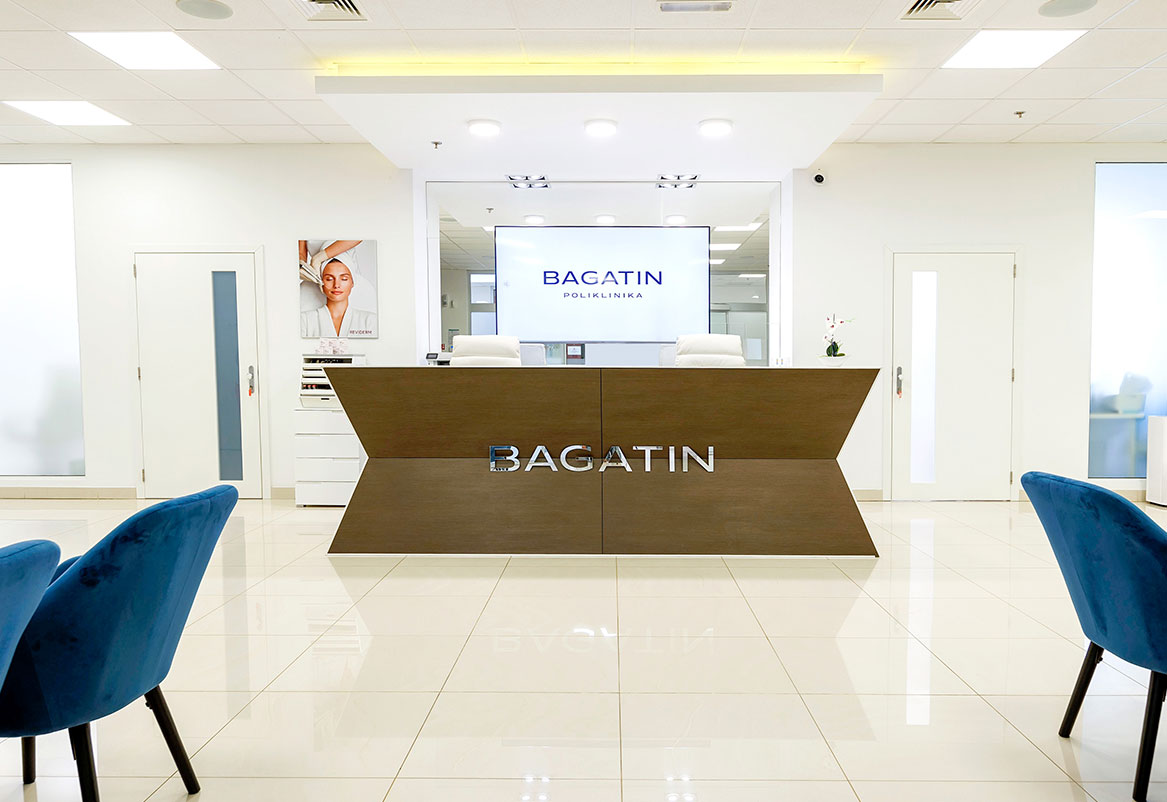Aesthetics
Face
The most modern facial treatments help you look younger, more elegant and happier.
Body
Feel comfortable in your body and correct sources of discomfort.
Chest
Make your wish for a better appearance come true and restore your self-confidence with aesthetic correction.
Hair and scalp
Minimally invasive solutions for hair loss and a natural look.
Issues
Find solutions to some of the most common aesthetic problems.
Treatments
Treatments

Hair and scalp mesotherapy

Thinning hair therapy with your own blood

Trichotest – DNA analysis of hair loss and baldness

Hair loss in women – causes and how to prevent it

Hair loss in men – causes and how to prevent it

Alopecia – hair loss
FACE

BODY

Implantology Center
Different methods of solving the problem of missing one or more teeth.
Prosthetics
The most common solution in cases of functional or aesthetic tooth damage.
Aesthetic Dentistry
Harmonious tooth shaping and tooth color correction according to your wishes.
General Dentistry
Modern and timely diagnostics, treatment and dental hygiene are the key to the health of your teeth.
Issues
Find solutions to some of the most common aesthetic problems.
About us
Locations
Consequences of missing teeth
-
Bone loss
When a tooth is missing, the jawbone is no longer stimulated by chewing, which over time leads to resorption and bone loss in that area. This process can cause changes in facial appearance, such as sunken cheeks and chin, which gives an older appearance.
-
Movement of remaining teeth
The adjacent teeth begin to tilt or shift into the empty space, which can result in an improper bite (malocclusion). The movement of teeth can create gaps and spaces where food can easily accumulate, increasing the risk of cavities and gum disease.
-
Speech problems
Teeth are crucial for pronouncing certain sounds, so missing teeth can lead to speech difficulties, such as "slurring" or trouble pronouncing certain words.
-
Decreased ability to chew and digestive difficulties
Missing teeth make it difficult to chew food effectively, which can lead to swallowing larger pieces of food and digestive problems. Also, people with missing teeth often avoid certain types of foods (such as nuts, meat, or harder vegetables), which can lead to an unbalanced diet and nutritional deficiencies.
-
Aesthetic problems and loss of self-confidence
Missing teeth can affect the appearance of your smile and overall face, which can reduce self-confidence and affect the quality of social and professional interactions.
People with missing teeth often feel insecure in communication and smile less due to feelings of discomfort. -
Load on remaining teeth
When one or more teeth are missing, the remaining teeth take on additional load during chewing, which can cause them to wear, crack, or become damaged.
Different tooth replacement options
-
Dental implants
Dental implants are artificial replacements that are implanted into the jawbone to replace the roots of missing teeth.
A screw-shaped implant is placed in the jawbone where the tooth is missing, and an implant suprastructure is placed on top of it, on which the prosthetic work is then placed. -
Dental bridge
A dental bridge is a type of permanent prosthetic work used to replace one or more missing teeth. A bridge consists of two or more interconnected crowns that are fixedly attached to natural teeth or implants on either side of the gap.
-
Dental crowns
Ceramic crowns, also known as porcelain crowns, porcelain teeth, porcelain veneers, are the most common prosthetic solution in cases of functional or aesthetic tooth damage.
They are made of ceramic that perfectly imitates the color of the tooth, and the crown itself protects the tooth from further damage and prevents its further decay.
Advantages and disadvantages of different tooth replacement methods
-
Dental implants
Advantages
Implants are the most permanent solution, lasting up to 25 years or more with proper care. Implants provide the feel and functionality of a natural tooth, making them extremely comfortable. The implant stimulates the jawbone, preventing the bone loss that occurs when a tooth is missing. Unlike bridges, implants do not require grinding down adjacent teeth.
Disadvantages
Implants are a more expensive option compared to bridges or dentures. Implant placement involves a surgical procedure, which may not be advisable for people with certain medical conditions. The process can take several months for the implant to fuse with the bone (osseointegration). -
Dental bridge
Advantages
A bridge takes less time to install than an implant, and the procedure can be completed in a few visits to the dentist. Bridges are usually less expensive than implants. A bridge offers stability during chewing and speaking and looks natural.
Disadvantages
The teeth on either side of the gap must be ground down to support the bridge, even if they are healthy. Without a tooth root, the bone beneath the gap can recede over time. Bridges typically last 10-15 years, which is less than implants. -
Dental crowns
Advantages
Dental crowns allow for normal chewing and speech function, which is especially important for teeth that are severely damaged or broken. Modern crowns (especially ceramic and porcelain) are made to resemble natural teeth, improving the appearance of the smile and restoring the natural appearance of the tooth. Crowns completely cover the damaged tooth, providing protection and strengthening it and preventing further damage. Dental crowns are durable and can last 10-15 years or even longer with proper care and maintenance.
Disadvantages
To place a crown, it is necessary to grind (remove) part of the tooth, which can weaken the remaining tooth structure. This is an irreversible procedure because the enamel cannot regenerate. After the crown is placed, some patients may experience sensitivity to hot or cold foods and drinks. This can last for several days or weeks, and sometimes longer.
Although crowns are attached with special cement, they can loosen or fall out over time, especially if the cement is damaged or if the tooth is exposed to high forces during chewing.
Although crowns are durable, they can be damaged or cracked, especially if they are ceramic or porcelain crowns, when chewing hard foods or if the patient has a habit of grinding their teeth.
Tips for maintaining dental health
-
Brush your teeth regularly.
Brush your teeth at least twice a day – in the morning and before bed, using a soft-bristled toothbrush and toothpaste that contains fluoride.
Brush for at least two minutes and pay attention to all surfaces of your teeth – the outside, inside and chewing surfaces. -
Use dental floss daily.
Dental floss removes plaque and food debris from between teeth and below the gum line, an area that a toothbrush cannot reach.
Floss at least once a day, ideally before brushing in the evening. -
Use mouthwash
Antibacterial mouthwash helps reduce plaque, bacteria and bad breath. Look for water that contains fluoride for extra protection against tooth decay.
-
Proper nutrition
Avoid foods that are too sweet and acidic, such as sweets, carbonated drinks, citrus fruits, and juices, as they can cause cavities and damage enamel.
Eat balanced meals with plenty of fruits, vegetables, whole grains, lean proteins, and dairy products, which are rich in calcium and strengthen teeth. -
Visit the dentist regularly.
Visit your dentist at least twice a year for a professional cleaning and checkup, even if you have no visible problems.
Regular check-ups help in the early detection and treatment of problems such as cavities, gum disease, or other oral problems.
Costs and financing of tooth replacement
The costs of tooth replacement can vary depending on the type of procedure, the materials used, and the location of the dental office. In cooperation with banks, Bagatin Polyclinic provides the option of paying in installments, as well as interest-free payments up to a certain number of installments.
BLOG SUGGESTION





















